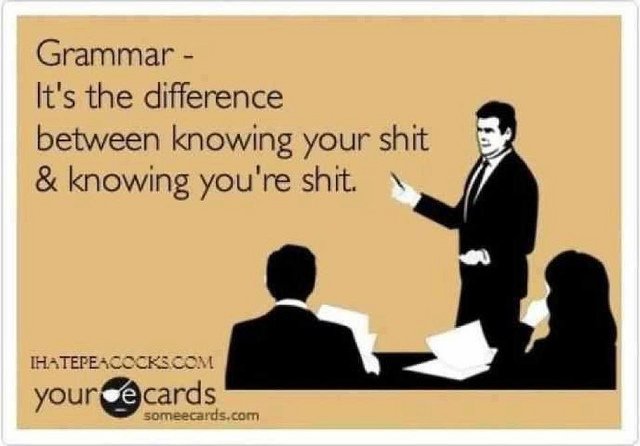
Teaching Grammar
I love that meme, it’s the shit.
Anyways, I just wanted to point out some very interesting points of discussion both of my groups brought up in class today. The first being basic grammar skills and lessons. We discussed that most of us were given the basic roundabout grammar generalizations somewhere between elementary and middle school. Where we got the “this is a noun, and this is a verb” impeccable knowledge implementation. Whoo! Now we’re all on the same page. But we couldn’t seem to agree on whether or not grammar lessons were crucial to good writing. Someone even mentioned that in their article it said that according to studies, it had no noticeable effect on students ability to write clearly. Which only makes me wonder, is it as crucial as learning cursive?
The second, was a point that I found to be very interesting in my article, “The Phenomenology of Error” by Joseph M. Williams. This was the idea a researcher had which required readers to only report on errors they noticed in a first reading. Which we then discussed as a group and came to a conclusion that the first reading, to anyone other than a teacher, is the most crucial and somehow also the most forgiving. This is, because most writing outside the academic realm, which is what most teachers dream their students will aspire to, is seen in newspapers and magazines and so on. Therefore, unless the piece is being used for an academic resource, the reader will likely only read the material once, which means the author only gets one chance to make a strong case and a good impression. Therefore, the first reading only really accounts for content, not mechanical errors. So if it’s readable, it’s doable. But, where do we draw the line? What is not doable? How bad does it have to be? Oh, that’s a scary thought.
The final point we covered was how grammar tends to hold more meaning than mechanics. We talked about how many young writers are shamed for “writing the way they talk” when more often than not, talking out a problem creates a much clearer argument and solution, than just putting pen to paper. I’ll be the first to admit I write exactly the way I speak. Which lead us directly into the practice of what we deemed “mock writing.” Where students are given, or choose, an author of merit to annotate, analyze, and recreate and how practice in this manner is much more effective than blah blah blah rules!
Ok, I lied, we discussed one more very interesting point. That of which a tutor in the ESL tutoring center noted to be pretty interesting. They discovered that, interestingly enough, often times when a student of another first language is being critiqued on a “grammar mistake” they are, in fact, often correct. And we attributed this to the fact that English learners tend to learn “from the book,” where as native speakers learn from culture and experience. So a grammar mistake we native speakers might catch, could be an existing “rule” someone created long ago, and this new learner is simply abiding by. There is no answer to who is correct here, its just an interesting thought that and English learner may actually be “better at this” than we native speakers are.
Just some food for thought folks.